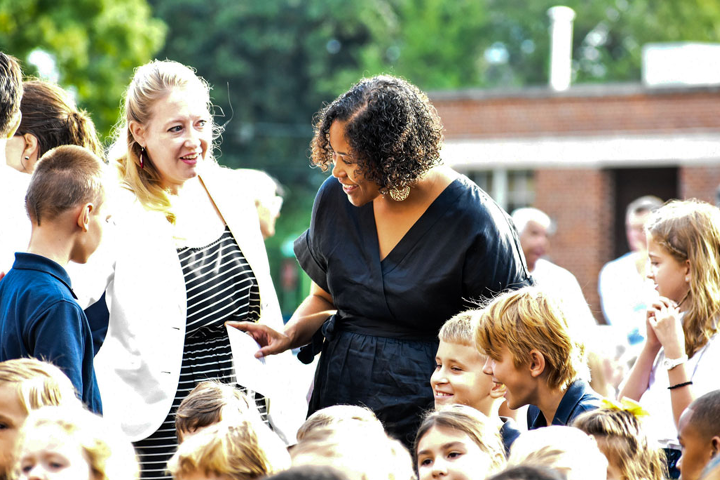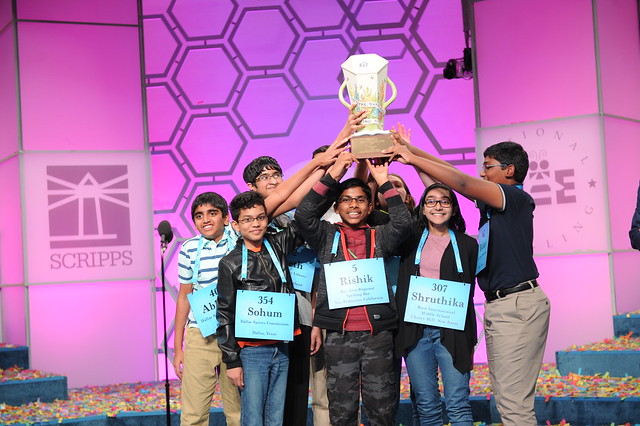About five years ago, something unusual started happening in the neighborhood surrounding a former Baptist seminary in north Richmond. Though not considered desirable real estate by many, the area swelled with families interested in attending a local school.
But it was not a public school, as is often the case. These newcomers were the parents and staff of Veritas School, a classical Christian school that had recently purchased the old Baptist seminary. The culture the families and the school have created together represents a fascinating example of a “moral ecology”—one that may provide valuable insights for parents and schools elsewhere, whether the schools are secular, Christian, public, or private.
One of the families in this Richmond neighborhood is the Kleinschusters. Dan and Dana Kleinschuster’s four children began attending Veritas 14 years ago when it was renting a Presbyterian church building, and the couple has always deeply appreciated the sense of connection among parents at the school. They realized that eventually their children would graduate, and that they would no longer interact with other parents—unless they were neighbors. So a year and a half ago, they sold their home in the Windsor Farms neighborhood and bought a house near the school.
“There are kids over five days a week, often spending the night,” Dan says. “We’ve had music classes held in our home. On Saturday night, every two weeks, we have Veritas families over for dinner. We love connecting people, older and newer families.”
The Kleinschusters’ youngest child is in eighth grade, but their desire to live near the school is long-term.
“We did it because we think that what is happening there might not be just for the next four or twelve years for our family, but for much longer,” Dan says. “Even after our kids are gone, we will still get to live and enjoy community with each other.”
Dan meets with fathers of his kids’ classmates after each child begins seventh grade—a stage at which many new families join the school. He hopes to ensure the fathers are unified in handling issues like cliques and dating.
“We want them to come into a culture that we have worked on,” Dan says. “You can influence culture in a lot of different ways. We are protective and mindful of establishing a culture that cultivates kids’ hearts to love things that are true, good, and beautiful.”
A love for such classical ideals is precisely what Veritas seeks to inculcate, and while the passionate engagement between Veritas families has grown independently and organically, it has also been intentionally cultivated. The school leadership works hard to connect families to the school and to one another.
At back-to-school night, the “Partnership at Veritas” slideshow includes a slide noting three events parents are expected to attend: the back-to-school night itself, a community dinner, and the spring forum. Veritas makes name tags for each parent, in part so that the unclaimed badges indicate who isn’t there. Attendance at these events is considered part of the covenant parents make with the school. Another slide lists 10 more types of parent meetings, from a speaker series to grade-level meetings to “curriculum coffees.” These are optional but strongly encouraged.
Head of School Keith Nix doesn’t apologize for the emphasis placed on nurturing the parent-school bond.
“We spend an inordinate amount of time on parent education and acculturation,” Nix says. “A classical education needs a classical home. We seek a culture where the parents are so on board with us that the teachers don’t have to do all the teaching.”
Creating this match between home and school begins during the application process. Parents must complete required reading on classical Christian education before they can even interview. Veritas also makes sure prospective parents agree with the school’s core goals and beliefs, including a “Portrait of a Graduate” document, a statement of faith, and an explanation of classical education distinctives. Their guidelines state, “Our published goals and beliefs make up the non-negotiable ‘90%’ that define us as a school.… When families and the schools agree on this 90%, the other 10% can be approached with graciousness and flexibility.”
Because of this up-front disclosure of its priorities and expectations for almost complete agreement, Veritas tends to attract compatible families to begin with.
“When a school is serving people of various and different approaches, you don’t know where a parent is coming from, and it can be challenging to exist in that environment,” says Jacquelin Aronson, whose four children began attending Veritas last year. “When you can be with families where you know they are raising their children in a Christian home, you get constant support without first having to figure out what others believe. Veritas has set the stage for that because they are crystal clear in their identity.”
Veritas is particularly proactive about transmitting its core value of raising children of strong character. Their flagship means of doing so is called “Veritas U,” an educational program for parents offered two or three evenings per year. Veritas U serves to unite parents around character formation topics and subjects central to classical education. To this end, parents can attend classes on anything from relationships and guidelines for technology use to Latin and theology.
The goal of these events is to have parents adopt the same principles and priorities that are valued within the school.
“When you have a partnership with parents—parent to parent, and school to parent—there is a lot less conflict between the messages a kid hears at home and what he hears at school,” Dan explained. “When there’s conflict, a kid says, Which message is more important? Which one do I listen to and which do I ignore? But because there is a strong partnership, kids are not trying to put on their scale two things that there’s a lot of conflict about. Similar messages are being told in all their spheres of influence.”
Sending the same message in all spheres of influence is what James Davison Hunter and Ryan S. Olson refer to as a strong “moral ecology.” In The Content of Their Character: Inquiries into the Varieties of Moral Formation, they define a moral ecology this way:
When social institutions—whether the family, peer relationships, youth organizations, the internet, religious congregations, entertainment, or popular culture—cluster together, they form a larger ecosystem of powerful cultural influences.
The quality and consistency of moral ecologies are so important because character is not formed in isolation. Messages about character are either strengthened or sabotaged by the various influences in a child’s life. Research has shown that the more coherent a moral ecology, the better a student’s outcomes. As Hunter and Olson write,
Moral ecologies can vary by how coherent or incoherent they are, how thick or thin, how well-resourced or impoverished, how articulate and inarticulate… Character is invariably formed in these moral ecologies and is reflective of them. The central question is the character and quality of the moral ecology.
There are now 95 Veritas families living in the two small zip codes that surround the school. According to Dan Kleinschuster, every time a home nearby comes up for sale, Veritas families consider buying it. The school—with its relational connectedness and consistency between home and classroom— is an unusually strong example of a coherent moral ecology. Such an environment is likely to create the moral discipline and moral attachment necessary to ensure the children will practice into adulthood the virtues they’re learning now.
The Veritas community’s values aren’t shared by every school community, of course. Still, Veritas’s parental initiative, its vigorous and reciprocal parent-school relationship, and in some cases, even its creation of a neighborhood of similar values are things schools can promote in an effort to ensure their students develop a moral character that lasts into the future.


